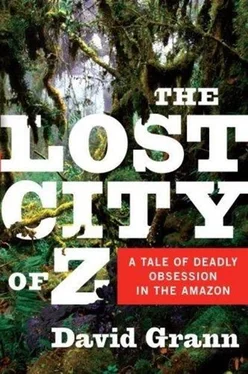130 “On climbing the opposite”:Fawcett, “In the Heart of South America,” pt. 3, p. 552.
130 “[Fawcett] disappeared”:Costin to daughter Mary, n.d., Costin Family Papers.
131 “[They] helped us”:Fawcett, “Further Explorations in Bolivia,” p. 388. 131 “The men are”:Ibid.
131 “After a few minutes”:Costin to daughter Mary, n.d., Costin Family Papers. 131 “a most intelligent”:Fawcett, “Further Explorations in Bolivia,” p. 388.
131 “There are problems”:Fawcett to RGS, Oct. 15, 1909, RGS.
132 “Without any hesitation”:Costin to daughter Mary, Nov. 10, 1946, Costin Family Papers.
132 “Whenever he came”:Costin, Daily Chronicle (London), Aug. 27, 1928.
132 “I know, from persons”:Suarez, Lembcke, and Fawcett, “Further Explorations in Bolivia,” p. 397.
132 “standing deliberately”:Nina to Keltie, 1909, RGS.
133 “His encounter with”:Nina Fawcett to John Scott Keltie, Jan. 11, 1911, RGS. 133 There was, however:Costin, Daily Chronicle (London), Aug. 27, 1928.
133 “He did not wish”:Ibid.
133 “we could see”:Ibid.
134 “Food problems”:Percy Harrison Fawcett, Exploration Fawcett, p. 171. 134 “[The Echojas] would”:Ibid., p. 149.
134 “I sucked, whistled”:Fawcett, “In the Heart of South America,” pt. 2, p. 495.
134 “With illness and disease”:Fawcett, Exploration Fawcett, pp. 168-69.
135 “In 99 cases”:Fawcett, “In the Heart of South America,” pt. 4, p. 92.
135 Though some of the first:For details on the first encounter between Native Americans and Europeans and on the Las Casas and Sepúlveda debate, see Huddleston, Origins of the American Indians; Todorov, Conquest of America; Pagden, European Encounters with the New World; and Greenblatt, Marvelous Possessions.
135 “The Spanish have”:Quoted in Columbia University, Introduction to Contemporary Civilization in the West, pp. 526-27.
135 “Are these not men?”:Quoted in Pagden, European Encounters with the New World, p. 71.
135 “pretending to be”:Las Casas, Short Account of the Destruction of the Indies, p. 12.
135 “the simplest people”:Ibid., pp. 9-10.
136 “Is there any notable”:British Association for the Advancement of Science, Notes and Queries on Anthropology, pp. 10-13. These racist views toward Native Americans were by no means limited to the Victorians. In 1909, the scientific director of the São Paulo Museum, Dr. Hermann von Ihering, contended that because Indians contribute “neither to labour nor to progress,” Brazil had “no alternative but to exterminate them.”
136 many Victorians now:For my descriptions of Victorian attitudes on race, I've drawn on several excellent books. They include Stocking, Victorian Anthropology; Kuklick, Savage Within; Stepan, Idea of Race in Science; and Kennedy, Highly Civilized Man.
136 “ quasi-gorillahood”:Quoted in Kennedy, Highly Civilized Man, p. 133.
137 “ sub-species”:Ibid., p. 143.
137 “these poor wretches”:Quoted in Stocking, Victorian Anthropology, p. 105.
137 “firmness”:Quoted in A. N. Wilson, Victorians, pp. 104-5.
137 eugenics, which once:Victoria Glendinning, Leonard Woof: A Biography (New York: Free Press, 2006), p. 149.
137 “children in mind”:Quoted in Stocking, Victorian Anthropology, p. 157.
137 lost tribes of Israel:According to the Bible, in 722 B.C., the Assyrian army carried away and dispersed ten tribes from the northern Israelite kingdom. What happened to them has long mystified scholars. In the middle of the seventeenth century, Antonio de Montezinos, a Sephardic Jew who had escaped the Inquisition, claimed that he had found the descendants of the tribes in the Amazon jungle-that land “where never mankind dwelt.” Some of the Indians, he reported, had said to him in Hebrew, “Hear O Israel! The Lord Our God the Lord is One.” The influential European rabbi and scholar Menasseh ben Israel later endorsed Montezinos's account, and many believed that the Indians of America, whose origins had long confounded Westerners, were in fact Jews. In 1683, the Quaker and founder of Pennsylvania, William Penn, said that he was “ready to believe” that the Indians were indeed “of the stock of the Ten Tribes.”
137 These theories were also picked up by the Mormons, who believed the Indians had originated, in part, from a migration of Jews. 137 “There are all sorts”: Los Angeles Times, April 16, 1925.
137 “jolly children”:Fawcett, Exploration Fawcett, pp. 170, 201.
138 “savages of”:Ibid., p. 215. 138 “My experience”:Ibid., p. 49.
138 “roasted over”:Percy Harrison Fawcett, “Bolivian Exploration, 1913-1914,” p. 225.
138 “elaborate ritual”:Fawcett, Exploration Fawcett, p. 203.
138 “plain proof”:Ibid., p. 170.
138 “He knew the Indians”:Thomas Charles Bridges, Pictorial Weekly, n.d.
138 “He understood them”:Costin, Daily Chronicle (London), Aug. 27, 1928.
138 “mental maze”:Kennedy, Highly Civilized Man, p. 143.
138 “There are three”:Fawcett, Exploration Fawcett, p. 95.
139 “white as we”:Quoted in Babcock, “Early Observations in American Physical Anthropology,” p. 309.
139 “men, women and”:Quoted in Woolf, “Albinism (OCA2) in Amerindians,” p. 121.
139 “very white”:Carvajal, Discovery of the Amazon, p. 214.
139 “Nietzschean explorer”:Hemming, Die If You Must, p. 78.
140 “Probably none of us”:Fawcett, “Bolivian Exploration, 1913-1914,” p. 222. 140 “They slipped in”:Fawcett, Exploration Fawcett, pp. 199-200.
140 “Don't move!”:Costin, Daily Chronicle (London), Aug. 27, 1928.
140 “I myself made”:Ibid.
140 “Our friendship”:Fawcett, Exploration Fawcett, p. 199.
141 They had befriended:The renowned Swedish anthropologist Baron Erland Nor-denskiöld later reported that Fawcett had “discovered an important indigenous tribe that… has never been visited by the white man.”
141 “We do not”:Bowman, “Remarkable Discoveries in Bolivia,” p. 440.
141 “Perhaps this is why”:Fawcett, Exploration Fawcett, p. 173.
141 “The tribe is also”:Fawcett, “Bolivian Exploration, 1913-1914,” p. 224.
141 “intractable, hopelessly brutal”:Ibid., p. 228.
141 “brave and intelligent”:Fawcett, Exploration Fawcett, p. 200.
142 “Wherever there are”:Percy Harrison Fawcett, “Memorandum Regarding the Region of South America Which It Is Intended to Explore” (proposal), 1920, RGS.
Читать дальше
Конец ознакомительного отрывка
Купить книгу












